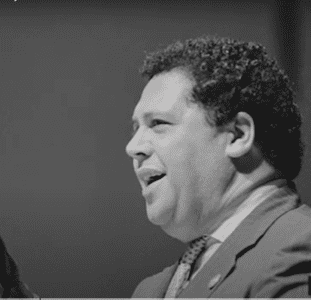
The passion for diversity, equitable and fair treatment courses through the veins of both Maynard and Wendy Eley Jackson, the husband and wife pair who formed Auburn Avenue Films. They can’t help themselves. He’s the namesake and son of Maynard Holbrook Jackson Jr., who was not only the first African American and longest serving mayor of Atlanta, but, as described in his obituary in the New York Times, “embodied the seismic shift in political power from Atlanta’s white establishment to its growing black middle class.” And the world’s largest airport is named in his honor.
She’s the daughter of one of the original Tuskegee Airmen, Leroy Edward Eley Sr., who worked as an aviation inspector for the Apollo space program in the ’60s and helped build the Lunar Excursion Module, which was part of the spacecraft, as well as worked as a flight instructor for more than 50 years.
“When it comes to fighting for rights, I really don’t have to reinvent the wheel. I can point to my dad’s template. He was always concerned with equal rights for all and it was pretty much his mantra. We must have a concentrated effort for our people and be inclusive of everyone,” illuminates Jackson III.
The Jacksons are fiery advocates for minorities and women in Georgia’s thriving film and TV industry. The duo, in conjunction with their political and entertainment industry friends and colleagues, are gearing up for an entertainment revolution in Georgia in what has become home to one of the biggest film industries in the U.S., ranking third in production levels, behind Los Angeles and New York.
Representatives “Able” Mable Thomas, Dee Dawkins-Haigler, Ron Stephens, Winfred J. Dukes, and Stacy Abrams, legislators in the Georgia State House, created and passed a resolution (Resolution No. 1577) to create the Study Committee of Georgia Minority Participation in the Film and Television Production Industry. While gathering data, they discovered that during the fiscal year of 2015 alone, Georgia’s feature films and television industry generated an economic impact of $6 billion.
This information about minority participation in the film industry came under scrutiny when Auburn Avenue Films, the new television and film production company in Atlanta, started the process of making a documentary film, titled MAYNARD, about the life and times of Atlanta’s former mayor, Maynard Jackson.
We’ve read reports and heard the plea that skilled labor is needed despite the presence of a base of skilled labor already here in Georgia. Filmmakers claim it has become difficult to staff their productions to fill the roles of makeup artists, costume and set designers, and “below the line” workers with skills in animation, cinematography, editing, post production, and visual effects. Resulting in Georgia governor Nathan Deal’s creation of the Georgia Film Academy and a partnership among the mayor’s Office of Film and Entertainment, IATSE Local 479, the film industry, and the Atlanta Workforce Development Agency (AWDA), which has the duty to identify qualified applicants for positions as trainees in motion picture and television productions in Atlanta. AWDA pays trainees’ wages for the duration of the program, which may last as long as 17 weeks.
“I was involved in a partnership in a production company that saw really good times. During the recession, everyone was hit, including the people in the entertainment industry. I almost lost it all. Wondering if I was going to be able to take care of my children was the most hurtful feeling in the world. I had to create a different platform, for myself, and start looking in a different direction,” Wendy shares.
The Entertainment Investment Act offers an incentive inclusive of a 20 percent tax credit for production companies that spend at least $500,000 on production or post-production in Georgia, as well as an additional 10 percent for those who put the “big peach” promotional logo in the film credits.
“Atlanta Mayor Kasim Reed is doing a really good job of identifying creators. We have a new director in the entertainment office, Chris Hicks, who brings a wealth of knowledge and he is on the pulse of making a lot of different changes for the established and aspiring filmmaker of all colors,” offers Wendy.
“I look to Winsome Sinclair, Roger Bobb, Jeff Cooper, and Paul Garnes … they should be at the top of the food chain, the first round pick for everything. Their struggle is still hard. The projects they’ve worked on have seen hundreds of millions of dollars in revenue. Where is their piece of the pie?”
The 248 film and television productions shot in Georgia in the 2015 fiscal year spawned $1.7 billion in spending in the state.
“I would love to see the fruits of this before I retire. I want my children and my children’s children to see this opportunity as a chance to do their very best and subsequently watch their dollar multiply to millions. If we’re not going to be given the same opportunity and are made to watch from behind the gate while others prosper … that doesn’t work for me. My father could out fly most. I remember him talking about African American pilots being overlooked and what it took to change that. I am hopeful and excited. In the meantime, we have to push,” she closes.











